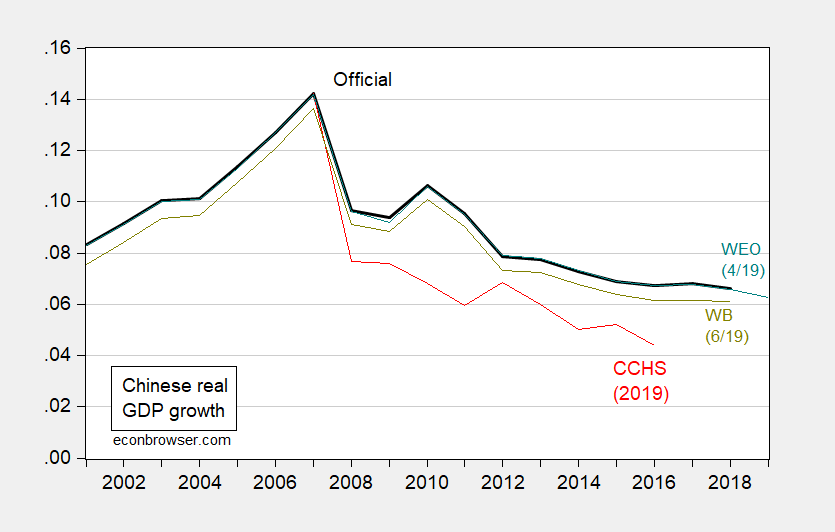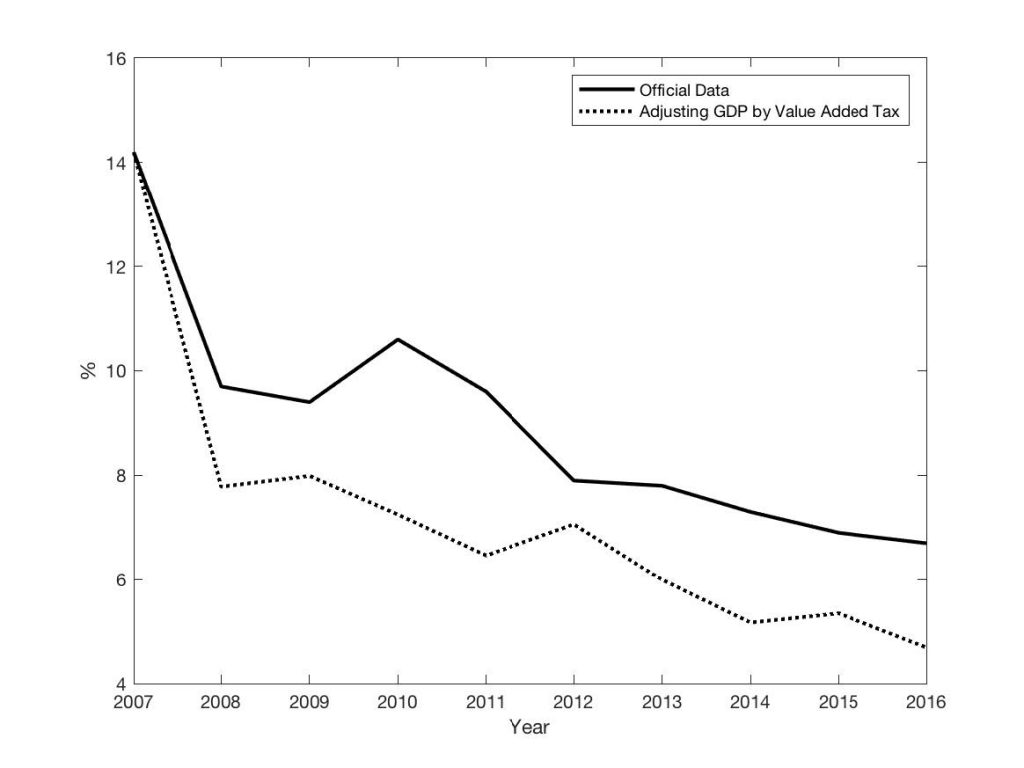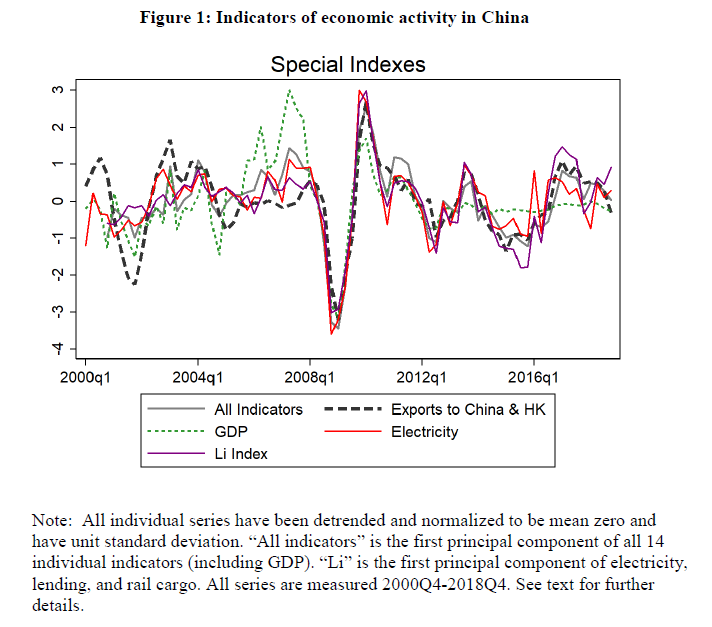I’ve noticed a tendency for some commentators to believe the Chinese economy is about to topple. One such instance is Gordon Chang writing in the National Interest:
Take the year 2016 as an example. The NBS reported that China’s gross domestic product grew 6.7 percent that year. In 2017, however, the World Bank issued a bar chart showing that China’s GDP increased only 1.1 percent
One has to wonder why in 2019 Chang is citing an unspecified 2017 World Bank report regarding 2016 performance. Well, time to — gasp — look at the data.
Figure 1 shows the official series, as well as the World Bank estimate, and the IMF’s forecast.
Figure 1: Annual growth rates, from Chinese NBS (black), World Bank (chartreuse), IMF World Economic Outlook (teal), and Chen, Chen, Hsieh and Song (red). Source, NBS via FRED, World Bank WDI (June 2019), IMF WEO (April 2019), and CCHS (2019).
In A forensic examination of China’s national accounts, Wei Chen, Xilu Chen, Chang-Tai Hsieh, and Zheng (Michael) Song produce estimates of actual GDP growth looking at detailed sectoral data. Their estimated growth is shown in their Figure 17 (and included in Figure 1 above, by eyeball estimates).
Source: Figure 17, from CCHS (2019).
North of 4% is substantially higher than 1.1%… just sayin’.
A clear-eyed view of Chinese vulnerabilities and strengths is requisite for crafting a successful policy of dealing with the Chinese. Neither doom-mongering nor over-stressing the strengths of the Chinese economy will serve us well.
As for recent data, Fernald, Hsu and Spiegel, “Is China Fudging Its GDP Figures” (2019) conclude for up to 2018:
Using principal components, we derive activity indices from a wide range of indicators (including GDP) and examine their fit with externally-reported Chinese and Hong Kong imports. In terms of measuring cyclical fluctuations, the quality of Chinese statistics have broadly become more reliable, though the evidence is more mixed for GDP.
This is shown in their Figure 1:
Source: Fernald, Hsu and Spiegel, (2019).



Gordon Chang wrote a book 18 years ago:
https://www.amazon.com/Coming-Collapse-China-Gordon-Chang/dp/0812977564
“The Coming Collapse of China”
Coming when? On 18 years later he writes a fluff piece that starts with:
https://nationalinterest.org/feature/its-time-america-break-beijing-63327
“Xi Jinping has rejected the concept of comparative advantage, the very notion underpinning the system of international commerce. Why should America sign a trade agreement with a country that does not believe in trade?”
One should stop reading his fluff right there. No – it is Trump who does not believe in comparative advantage.
I “get” what Menzie is saying here, and in a broad/ general way agree with it. But it should also be pointed out that if Chinese bureaucrats had made even half an attempt to accurately and truthfully do the economic statistics (which by the way, they still lie about to this day) a lot of this muddle could have been avoided. They knew Huawei was breaking to rules by selling products to Iran (the same as some American technology corporations had sold to the Syrians and other Mideast slaughterers etc), and yet similar to Barkley Junior and his non-existant “skewed” distribution, they go on months and years “walking” the lie.
If you sack provincial leaders for telling the truth on the numbers, or sack them “looking for reasons” to install your own cronies in, guess what happens?? People start telling lies galore to keep their jobs.
Do the Chinese keep better economic statistics than they did 20 years ago?? Certainly they do. America is also better at recycling used materials than we were in 1890. So I guess no need for progress there folks, We’re finished on our progress on this recycling stuff. And who needs high-speed bullet trains?? America’s cars and semis perform better than chuckwagons, so we’re finished there.
In summary, for the slow-witted—quit making up numbers as you go along—-and you’ll avoid a lot of “cottage industry” doom-sellers.
*non-existent
i have argued with friends that china is about 50 years behind the us on a lot of things we take for granted, especially in the social-cultural-political intersection. local schools and governments operate in a similar manner to the us in the 1950’s. i would wager the same with respect for chinese data collection and distribution-probably about the same level of accuracy and authenticity of the 1950’s. as the people in the country demand more transparency (at the moment that is limited), the data will get better. i have simply found that if you try to apply modern usa to how china operates, you will always be disillusioned. but if you apply a time lag of about 50 years, there do seem to be some similarities. of course this is not across the board-technology is a big influence-but it still seems a like the 1950’s to a degree in china. the cultural revolution probably had a lot to do with this delay, as those folks are now in their retirement years and will begin to leave the bureaucracy more and more each year-and their influence will continue to diminish.
Mixed feelings there. Chinese people are very sharp. And there’s no doubt they have a stronger hunger or personal drive to excel than a large cross-section of America has right now. But what I always think of (and Professor Chinn and regular readers have probably become nauseated with my endless reiteration of this) when I think of China’s biggest problems is something W. Edwards Deming created called “The Red Beads Test”. How can you have large numbers of highly highly intelligent individuals with lots of energy and personal drive to excel kind of lost in a muddle and not getting where they want to be?? (Make no doubt, Chinese want to be #1, the BEST at everything, it is very much in their nature). The answer to me, lies in “The Red Beads Test”.
https://www.youtube.com/watch?v=ckBfbvOXDvU
Now some will say I’m comparing apples to oranges here—but the recent move by Beijing to have Carrie Lam force the extradition law on HK citizens is a textbook example of “The Red Beads Test”, You notice how Deming jokingly asks the students “Don’t you understand gravity??” The students laugh because they know it’s not a dig at they themselves–the students. The question “Don’t you understand gravity??” is a dig/insult aimed at the Beijing bureaucrats and Carrie Lam types. The Carrie Lam category of manager. Deming is doing his “Oscar winning role” as the Carrie Lam variety of management.
https://www.scmp.com/news/hong-kong/politics/article/3016701/hong-kong-leader-carrie-lam-needs-bold-action-save-her
1.1 must be China’s contribution to World GDP growth…